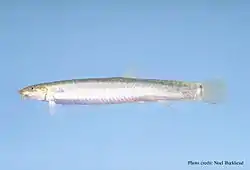泥鰌
Chinese
| For pronunciation and definitions of 泥鰌 – see 泥鰍 (“loach”). (This term, 泥鰌, is a variant form of 泥鰍.) |
Japanese

| Kanji in this term | |
|---|---|
| 泥 | 鰌 |
| Grade: S | Hyōgaiji |
| irregular | |
| Alternative spellings |
|---|
| 鰌 鯲 ドジョウ どぜう |
Alternative forms
Etymology
Unknown. Historical sources from the Muromachi period spell this in kanji as 土長 (literally “earth, soil + long”), and in historical kana as どぢやう (dodyau). [1] Theories suggest that the name may refer to the fish's apparent ability to thrive in muddy conditions. The kanji is an orthographic borrowing from Chinese 泥鰌 (whence modern Chinese 泥鰍/泥鳅 (níqiū)).
This word has a common unetymological historical kana spelling, どぜう (dozeu), which was popularized by Edo period merchants and is still in use today in restaurants.[2]
Noun
泥鰌 • (dojō) ←どぢやう (dodyau)?
Usage notes
As with many terms that name organisms, this term is often spelled in katakana, especially in biological contexts (where katakana is customary), as ドジョウ.
References
- 2006, 大辞林 (Daijirin), Third Edition (in Japanese), Tōkyō: Sanseidō, →ISBN
- 1988, 国語大辞典(新装版) (Kokugo Dai Jiten, Revised Edition) (in Japanese), Tōkyō: Shogakukan
Further reading
- Etymology at Nihon Jiten (in Japanese)
- Etymology at Gogen-Allguide (in Japanese)
This article is issued from Wiktionary. The text is licensed under Creative Commons - Attribution - Sharealike. Additional terms may apply for the media files.